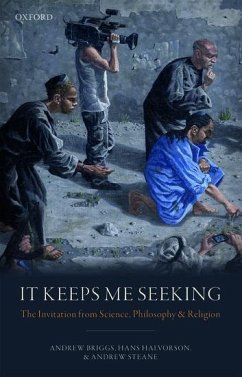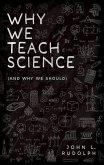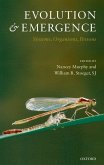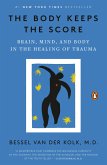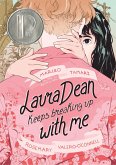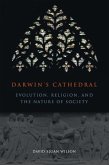Andrew Briggs (Professor of Nanomateria Professor of Nanomaterials, Hans Halvorson (Stuart Professor of Stuart Professor of Philosophy, Andrew Steane (University Lecturer and University Lecturer Fellow
It Keeps Me Seeking
The Invitation from Science, Philosophy and Religion
Andrew Briggs (Professor of Nanomateria Professor of Nanomaterials, Hans Halvorson (Stuart Professor of Stuart Professor of Philosophy, Andrew Steane (University Lecturer and University Lecturer Fellow
It Keeps Me Seeking
The Invitation from Science, Philosophy and Religion
- Gebundenes Buch
- Merkliste
- Auf die Merkliste
- Bewerten Bewerten
- Teilen
- Produkt teilen
- Produkterinnerung
- Produkterinnerung
An exposition on the common phrase "science and religion". Science has something to say about every aspect of human experience, and religion is, broadly speaking, the attempt by people to find and assert meaningfulness.
Andere Kunden interessierten sich auch für
![Oxford Reading Tree TreeTops Fiction: Level 12: Clive Keeps His Cool Oxford Reading Tree TreeTops Fiction: Level 12: Clive Keeps His Cool]() Michaela MorganOxford Reading Tree TreeTops Fiction: Level 12: Clive Keeps His Cool16,99 €
Michaela MorganOxford Reading Tree TreeTops Fiction: Level 12: Clive Keeps His Cool16,99 €![Why We Teach Science Why We Teach Science]() John L. Rudolph (Departm Vilas Distinguished Achievement professorWhy We Teach Science37,99 €
John L. Rudolph (Departm Vilas Distinguished Achievement professorWhy We Teach Science37,99 €![Evolution and Emergence Evolution and Emergence]() Stoeger, SJ, William R. (Staff Astrophysicist, Vatican Observatory,Evolution and Emergence250,99 €
Stoeger, SJ, William R. (Staff Astrophysicist, Vatican Observatory,Evolution and Emergence250,99 €![The Body Keeps the Score The Body Keeps the Score]() M.D. Bessel van der KolkThe Body Keeps the Score12,99 €
M.D. Bessel van der KolkThe Body Keeps the Score12,99 €![The Secrets She Keeps The Secrets She Keeps]() Michael RobothamThe Secrets She Keeps8,49 €
Michael RobothamThe Secrets She Keeps8,49 €![Laura Dean Keeps Breaking Up with Me Laura Dean Keeps Breaking Up with Me]() Mariko TamakiLaura Dean Keeps Breaking Up with Me18,99 €
Mariko TamakiLaura Dean Keeps Breaking Up with Me18,99 €![Darwin's Cathedral Darwin's Cathedral]() David WilsonDarwin's Cathedral21,99 €
David WilsonDarwin's Cathedral21,99 €-
-
-
An exposition on the common phrase "science and religion". Science has something to say about every aspect of human experience, and religion is, broadly speaking, the attempt by people to find and assert meaningfulness.
Hinweis: Dieser Artikel kann nur an eine deutsche Lieferadresse ausgeliefert werden.
Hinweis: Dieser Artikel kann nur an eine deutsche Lieferadresse ausgeliefert werden.
Produktdetails
- Produktdetails
- Verlag: Oxford University Press
- Seitenzahl: 368
- Erscheinungstermin: 13. November 2018
- Englisch
- Abmessung: 223mm x 141mm x 30mm
- Gewicht: 634g
- ISBN-13: 9780198808282
- ISBN-10: 0198808283
- Artikelnr.: 52640744
- Herstellerkennzeichnung
- Libri GmbH
- Europaallee 1
- 36244 Bad Hersfeld
- gpsr@libri.de
- Verlag: Oxford University Press
- Seitenzahl: 368
- Erscheinungstermin: 13. November 2018
- Englisch
- Abmessung: 223mm x 141mm x 30mm
- Gewicht: 634g
- ISBN-13: 9780198808282
- ISBN-10: 0198808283
- Artikelnr.: 52640744
- Herstellerkennzeichnung
- Libri GmbH
- Europaallee 1
- 36244 Bad Hersfeld
- gpsr@libri.de
Andrew Briggs was elected in 2002 as the first holder of the newly created Chair in Nanomaterials at the University of Oxford. After studying physics at Oxford he gained a PhD at the Cavendish Laboratory in Cambridge, he then studied for a degree in Theology at Cambridge, winning the Chase Prize for Greek, before returning to Oxford in 1980 to pursue an academic career in science. His research interests focus on nanomaterials for quantum technologies and their incorporation into practical devices. Hans Halvorson is Stuart Professor of Philosophy at Princeton University. He has written extensively on philosophical issues in physics and the other sciences, on mathematical logic, and on the relationship between science and religion. He received the Mellon New Directions in the Humanities Fellowship (2008), the Cushing Memorial Prize in the History and Philosophy of Physics (2004), Best Article of the Year by a Recent Ph.D. (Philosophy of Science Association, 2001), and Ten Best Philosophy Articles of the Year (The Philosopher's Annual, both 2001 and 2002). Andrew Steane is a Physics Professor at Oxford University. His research is in fundamental physics. This includes experimental laser cooling and manipulation of atoms, quantum information theory and computing, and some aspects of relativity and thermal physics. From 1995-1999 he was a Royal Society University Research Fellow, based at the University of Oxford, and a Fellow by Special Election of St Edmund Hall, Oxford (1996-1999). In 1999 he became a University Lecturer and Tutorial Fellow in Physics of Exeter College, Oxford. He was awarded the Maxwell Medal and Prize of the Institute of Physics in 2000 for the discovery of quantum error correction. He has written two textbooks and two books for a wider readership.
1: Introduction: three themes
2: What is this book: re-orientation
3: Religion, history and philosophy
4: How is science to be carried forward?
5: What does it mean to be me?
6: Two Tabors
7: The deeply subtle nature of physically existing things
8: Issues arising from quantum physics
9: General relativity, language and learning
10: On the way
11: The argument from design
12: Biological evolution
13: The struggle is nothing new
14: Miracles and how God works
15: You can't live a divided life
16: A dialogue about naturalism
17: Learning from the Bible
18: Conclusion
2: What is this book: re-orientation
3: Religion, history and philosophy
4: How is science to be carried forward?
5: What does it mean to be me?
6: Two Tabors
7: The deeply subtle nature of physically existing things
8: Issues arising from quantum physics
9: General relativity, language and learning
10: On the way
11: The argument from design
12: Biological evolution
13: The struggle is nothing new
14: Miracles and how God works
15: You can't live a divided life
16: A dialogue about naturalism
17: Learning from the Bible
18: Conclusion
1: Introduction: three themes
2: What is this book: re-orientation
3: Religion, history and philosophy
4: How is science to be carried forward?
5: What does it mean to be me?
6: Two Tabors
7: The deeply subtle nature of physically existing things
8: Issues arising from quantum physics
9: General relativity, language and learning
10: On the way
11: The argument from design
12: Biological evolution
13: The struggle is nothing new
14: Miracles and how God works
15: You can't live a divided life
16: A dialogue about naturalism
17: Learning from the Bible
18: Conclusion
2: What is this book: re-orientation
3: Religion, history and philosophy
4: How is science to be carried forward?
5: What does it mean to be me?
6: Two Tabors
7: The deeply subtle nature of physically existing things
8: Issues arising from quantum physics
9: General relativity, language and learning
10: On the way
11: The argument from design
12: Biological evolution
13: The struggle is nothing new
14: Miracles and how God works
15: You can't live a divided life
16: A dialogue about naturalism
17: Learning from the Bible
18: Conclusion

